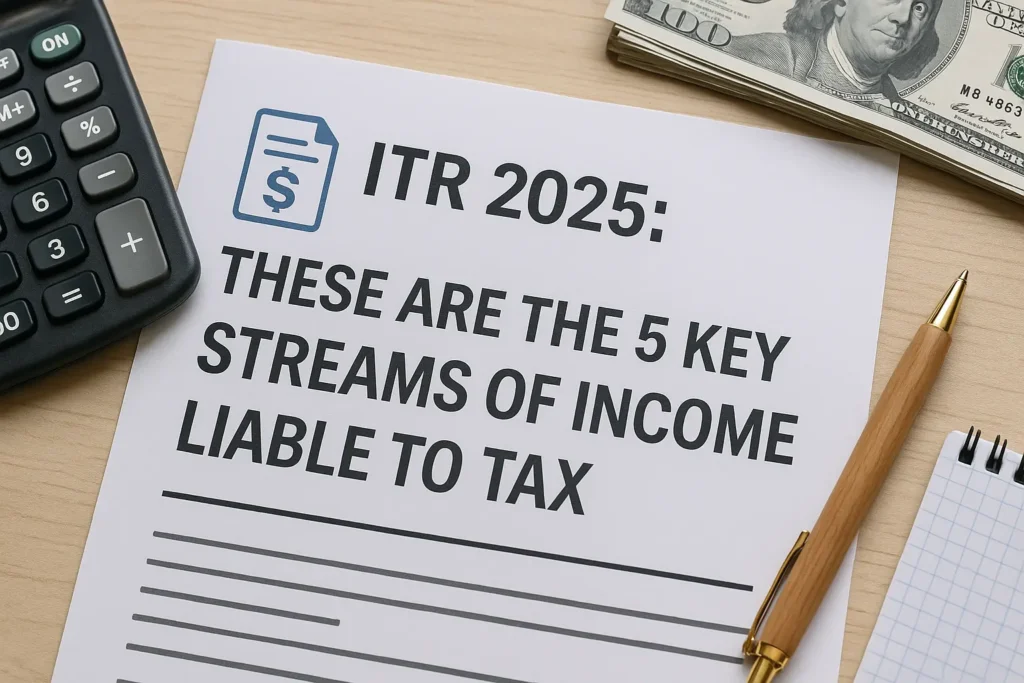Filing your ITR for 2025? Discover the 5 major income streams that are taxable under the IRS. From salary to crypto gains, learn what you must report and avoid costly penalties.
Introduction: Tax Season Is Coming — Are You Ready?
The 2025 tax season is just around the corner, and for millions of Americans, it’s time to face the numbers. Whether you’re a salaried employee, freelancer, investor, or crypto trader, knowing what income is liable to tax is critical.
Understanding the five primary income streams recognized by the IRS can save you from audits, interest, and penalties. This blog breaks them down in simple human terms — no jargon, just straight facts and helpful tips.
Let’s dive into the five key income sources that are fully taxable and what you need to know for ITR filing in 2025.
💼 1. Salary and Wages – The Most Common Income Stream
📌 What It Covers:
- Full-time/part-time salaries
- Bonuses, commissions, and overtime
- Fringe benefits (company car, housing, stock options)
✅ Why It’s Taxable:
Your salary is the most straightforward source of income and is taxed under federal, state, and sometimes local laws. Employers typically deduct taxes via withholding from each paycheck.
⚠️ Tip for 2025:
Use Form W-2 issued by your employer for filing. Double-check benefits that may be tax-deferred (like 401(k) contributions).
💰 2. Interest and Dividend Income – Passive Yet Taxable
📌 What It Covers:
- Bank interest
- Dividends from stocks (qualified and non-qualified)
- Earnings from mutual funds or ETFs
✅ Why It’s Taxable:
The IRS considers interest and dividends as earnings — even if you didn’t physically withdraw them. Interest is taxed at your ordinary rate, while qualified dividends may be taxed at lower capital gains rates.
⚠️ Tip for 2025:
Use Form 1099-INT and Form 1099-DIV. Keep in mind, dividend reinvestment plans (DRIPs) are still taxable even if you don’t receive cash.
🏘️ 3. Rental Income – Real Estate Isn’t Fully Passive
📌 What It Covers:
- Rent collected from tenants
- Advance rent payments
- Security deposits (if kept)
✅ Why It’s Taxable:
If you’re earning rental income, the IRS sees you as a landlord — and landlords are taxed. However, you can deduct certain expenses like:
- Property taxes
- Mortgage interest
- Repairs and maintenance
- Depreciation
⚠️ Tip for 2025:
Use Schedule E (Form 1040) for reporting rental income and expenses. Keep all receipts and records — IRS audits landlords more frequently than W-2 earners.
📈 4. Capital Gains – Stocks, Real Estate, and Crypto
📌 What It Covers:
- Profits from selling stocks, mutual funds, crypto, or property
- NFTs and digital assets
- Business asset sales
✅ Why It’s Taxable:
The difference between your purchase price and selling price is a capital gain. The IRS taxes:
- Short-term gains at your ordinary income rate
- Long-term gains (assets held over 1 year) at 0%, 15%, or 20% depending on your income
⚠️ Tip for 2025:
Use Form 8949 and Schedule D. With crypto and NFTs now tightly regulated, make sure you’re reporting every trade — even peer-to-peer or DeFi platforms.
🧾 5. Freelance, Business & Gig Income – The Rise of Self-Employment
📌 What It Covers:
- Freelance gigs (writing, design, consulting)
- Self-employed business profits
- Side hustles like Uber, DoorDash, Etsy, or YouTube
- Influencer income and affiliate commissions
✅ Why It’s Taxable:
Whether you’re a full-time creator or part-time driver, the IRS treats this as earned income. You’re also responsible for self-employment tax (Social Security + Medicare), which is about 15.3%.
⚠️ Tip for 2025:
Use Schedule C (Form 1040). Don’t forget you can deduct expenses like a home office, mileage, and software — but keep records. Apps like QuickBooks or Wave can help automate your accounting.

🔍 Bonus: Income You Might Think Is Tax-Free But Isn’t
Be cautious — the IRS taxes more than you may think. Here’s what is also reportable in most cases:
- Gambling winnings
- Unemployment benefits
- Prizes, awards, and contest earnings
- Debt forgiveness (including student loans in some cases)
- Canceled credit card debt
- Cryptocurrency airdrops or staking rewards
📋 What’s Not Taxable? (But Keep It Documented)
Some sources are usually non-taxable, but always verify:
- Life insurance payouts
- Gifts and inheritances (up to limits)
- Child support payments
- Employer reimbursements (if documented)
- Municipal bond interest
📅 Deadlines and Forms for 2025 Tax Filing
- Start of Filing Season: Likely mid-January 2025
- Tax Deadline: April 15, 2025
- Extension Deadline: October 15, 2025 (if requested)
Most of these incomes are reported via Form 1040 and relevant schedules. Failing to report any could trigger a red flag with the IRS.
🔐 Final Thoughts: Stay Ahead, Stay Compliant
Taxation in 2025 isn’t just about what you earn — it’s about what you report. The IRS is smarter, faster, and more digitally integrated than ever before.
From crypto wallets to side hustle platforms, there’s a growing web of information being shared between companies and the IRS. Your best protection? Stay honest and informed.
If you’re juggling multiple income streams, using a professional tax advisor or a trusted software like TurboTax or H&R Block can save you money and stress.
✅ Key Takeaways
| Income Stream | Tax Form | Tips |
|---|---|---|
| Salary/Wages | W-2 | Check benefits and 401(k) |
| Dividends/Interest | 1099-INT, 1099-DIV | Reinvested income is still taxable |
| Rental Income | Schedule E | Deduct expenses, track everything |
| Capital Gains | 8949 + Schedule D | Know short vs long-term rates |
| Gig/Freelance | Schedule C | Watch for 15.3% self-employment tax |

Aslo check it
Tensions Simmer as Xi Courts EU While Brussels Demands Trade Rebalance
